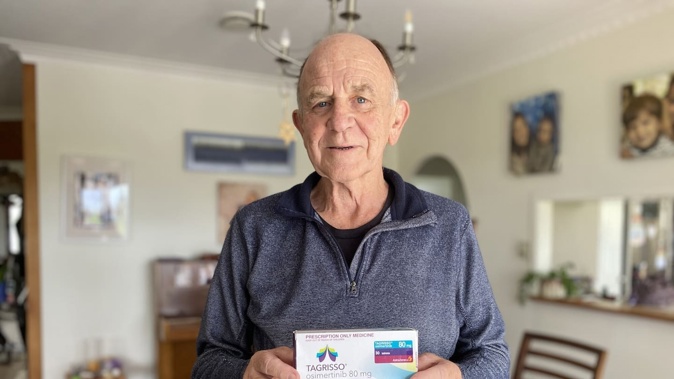
- A Whangārei retiree is frustrated at paying over $25,000 in GST for his cancer therapy.
- Revenue Minister Simon Watts said there are no plans to change GST rules, despite the concerns.
- Pharmac is considering funding the treatment for patients like Merv Williams, who are currently ineligible.
A Whangārei retiree funding his own targeted cancer therapy is frustrated that he has to spend more than $25,000 on GST alone over the three-year treatment.
Such payments should be exempt from the tax, believes Merv Williams, a grandfather of five, former Whangārei District councillor and former Strand Arcade manager.
Revenue Minister Simon Watts said there are no plans to change the GST rules, which are efficient in their lack of exemptions, but Pharmac said it is considering widening its criteria so people like Williams would be funded.
Williams, 70, has to pay nearly $180,000 for his cancer therapy, of which more than $25,000 will go on GST.
“It’s a tax on top of having to pay the healthcare. I would like to see a change in policy so that healthcare is not charged GST,” he said.
“They say it’s not funded because there’s not enough in the health budget, but then they take an extra tax off us.”
Williams, who recently retired full-time from work, was diagnosed in August 2024 with non-small-cell lung cancer, linked to a mutation in the gene for a protein called EGFR.
The diagnosis was a surprise because his only symptom was a very mild but lingering cough. However, previous health checks had flagged issues with a lung, including a section that had collapsed.
Thanks to health insurance, Williams was able to have surgery within two weeks of his diagnosis. His entire right lung was removed, along with several lymph nodes, three of which had cancer cells.
His specialist recommended he follow this up with a three-year course of osimertinib, which targets the EGFR mutation.
 Merv Williams and his wife, Jutta Kanuka, say the treatment is eating into their retirement savings, which would be better spent on things like visiting grandkids. Photo / Denise Piper
Merv Williams and his wife, Jutta Kanuka, say the treatment is eating into their retirement savings, which would be better spent on things like visiting grandkids. Photo / Denise Piper
The pill is made by AstraZeneca under the brand name Tagrisso. It costs $10,900 a month, including GST, although AstraZeneca has agreed to fund every other month for Williams’ treatment.
At the start of this year, Pharmac started funding osimertinib for patients with non-small-cell lung cancer with the EGFR mutation, but only for patients whose cancer is incurable. Williams is ineligible for this funding because his cancer was surgically removed.
While Williams is pleased his cancer is not considered terminal, having to pay for the drug himself will hit his retirement savings hard.
While he has some cover through insurer Southern Cross, the most its policy contributes for such cancer drugs is $8000 a year.
He said GST should be removed from such cancer therapies.
Simon Watts acknowledged the “difficult position” faced by cancer patients funding their own treatment.
 Revenue Minister Simon Watts says allowing a GST exemption on one thing would lead to more exemptions, meaning more tax would have to be found elsewhere. Photo / NZME
Revenue Minister Simon Watts says allowing a GST exemption on one thing would lead to more exemptions, meaning more tax would have to be found elsewhere. Photo / NZME
But the Revenue Minister said allowing a GST exemption for one type of goods or services would lead to exemptions for other deserving items, significantly increasing administration and resulting in a loss of revenue the Government would have to find elsewhere.
There is no discretion for GST on medical costs or treatment, nor for private medical costs to be a claimable expense for income tax purposes, and the coalition Government has no plans to change this, Watts said.
“The Government’s preference is to direct revenue directly to health services, such as the recent significant boost in Pharmac funding to ensure Pharmac can deliver additional vital medications.”
Pharmac’s director for equity and engagement, Dr Nicola Ngawati, said osimertinib is currently funded for patients with advanced non-squamous, non-small-cell lung cancer with a specific mutation, only if their cancer can’t be cured.
However, Pharmac is also considering an application to fund osimertinib as an additional treatment for this type of lung cancer after the tumour has been removed. It is currently seeking clinical advice on this, she said.
Ngawati said Pharmac works hard to fund as many medicines as possible to get the best health outcomes for New Zealanders, but having a fixed budget means it has to make difficult decisions about what medicines to fund.
This sentiment was also echoed by Southern Cross Health Insurance, with chief operating officer Andrea Brunner saying it has a limited funding pool for drugs not otherwise funded in New Zealand.
Brunner confirmed Williams’ KiwiCare plan covers up to $8000 a year, which can be used on cancer drugs approved by Medsafe but not funded by Pharmac.
Denise Piper is a news reporter for the Northern Advocate, focusing on health and business. She has more than 20 years in journalism and is passionate about covering stories that make a difference.
Take your Radio, Podcasts and Music with you









